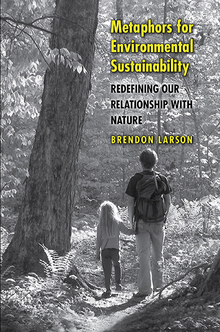Metaphors for Environmental Sustainability
WARNING
You are viewing an older version of the Yalebooks website. Please visit out new website with more updated information and a better user experience: https://www.yalebooks.com
Redefining Our Relationship with Nature
Brendon Larson
Scientists turn to metaphors to formulate and explain scientific concepts, but an ill-considered metaphor can lead to social misunderstandings and counterproductive policies, Brendon Larson observes in this stimulating book. He explores how metaphors can entangle scientific facts with social values and warns that, particularly in the environmental realm, incautious metaphors can reinforce prevailing values that are inconsistent with desirable sustainability outcomes.
Metaphors for Environmental Sustainability draws on four case studies—two from nineteenth-century evolutionary science, and two from contemporary biodiversity science—to reveal how metaphors may shape the possibility of sustainability. Arguing that scientists must assume greater responsibility for their metaphors, and that the rest of us must become more critically aware of them, the author urges more critical reflection on the social dimensions and implications of metaphors while offering practical suggestions for choosing among alternative scientific metaphors.
“An original and important addition to the study of science and language.”—Glenn Adelson, Director of Environmental Studies, Lake Forest College
“Larson’s treatment of DNA barcoding and invasional meltdowns are superb examples of how the social and linguistic studies of science should proceed. [T]his book…will continue to be cited and analyzed for decades to come.”—Steward T.A. Pickett, Cary Institute of Ecosystem Studies
"This is interdisciplinarity at its best: Larson's project is to explore the assumptions and biases that undergird our thinking about the environment. By exploring metaphorical constructs we routinely employ and by offering new ones, Larson offers the reader both a bold methodology and a renewed hope for environmental reform." —Vassiliki Betty Smocovitis, University of Florida at Gainesville
"Larson presents a fascinating array of research-spanning linguistics, rhetoric, sociology, psychology, biology, and ecology—in a beautifully interdisciplinary investigation of his topic . . . . an essential read for practicing scientists, editors and reviewers, students and teachers, policy-makers and funders, and the informed public."—Science
Publication Date: February 25, 2014
16 b/w illus.








